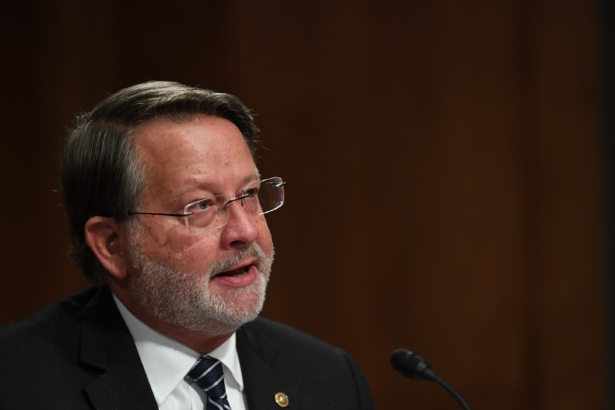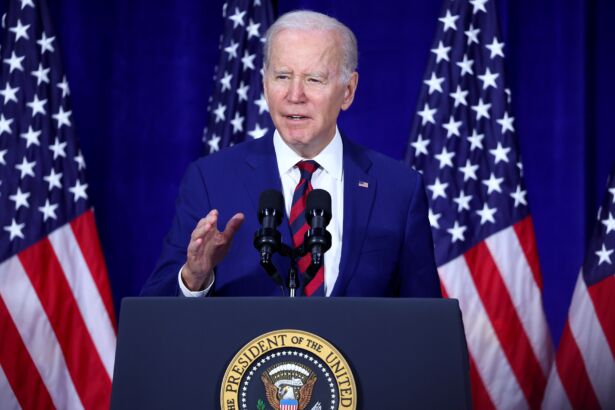A coalition of election integrity and voting rights leaders made an unsuccessful 11th-hour appeal to the U.S. Senate on March 13 to block the District of Columbia Council from giving non-citizens the right to vote in municipal elections.
Though the House of Representatives had passed a resolution of disapproval with strong bi-partisan support in February, Senate Majority Leader Chuck Schumer (D-N.Y.) and the Democrat leadership did not allow the matter to come before the Senate for a vote.
Two resolutions of disapproval, one by Sen. Tom Cotton (R-Ark.) and another by Sen. Ted Cruz (R-Texas), were introduced and then referred to the Committee on Homeland Security and Governmental Affairs.
The committee’s chairman Sen. Gary Peters (D-Mich.) did not schedule a hearing on either resolution thereby killing both.

Under the Home Rule Act a resolution of disapproval from both houses of Congress and agreed to by the president enables the federal government to overrule actions by the D.C. Council.
Inaction by the Senate allowed the Local Resident Voting Rights Act of 2022 (LRVRA), passed by the D.C. Council in October, to take effect on March 14.
Residency Over Citizenship
The LRVRA gives all residents over 18 that have lived in the district for 30 days the right to vote in local elections irrespective of citizenship status.
On the eve of the bill becoming law, the Public Interest Legal Foundation (PILF) called a press conference in Washington to draw public attention to what was about to happen if the Senate failed to act.
PILF is a national public interest law firm dedicated to election integrity, preserving the Constitutional framework of American elections, and protecting and preserving the right to vote.
Christopher Arps, president of Americans for Citizen Voting kicked off the meeting by saying, “The right to vote is not absolute. Only citizens are allowed to vote.”
Arps stated the coalition was in favor of “legal immigration.”
He said the LRVRA would add a “level of complexity and confusion” to the process of verifying eligibility to vote and harm accuracy.
Foreign Embassy Workers Can Vote
Ken Cuccinelli, formerly of the United States Citizenship and Immigration Services Agency, told reporters that the LRVRA would allow employees of China and Russia living and working in Washington to vote and thereby have a voice in the running of America’s nation’s capital.
“Mexico, Germany, and France do not allow non-citizens to vote. We are becoming a laughingstock in the eyes of our enemies,” he said.
Currently serving as the national chairman of the Election Transparency Initiative, Cuccinelli warned that the nation’s “big problem of unclean voter rolls” would be made worse by the LRVRA and similar laws in New York, Los Angeles, and San Francisco.
Seventy percent of Americans believe only citizens should vote, according to Cuccinelli.
Hogan Gidley, director of the America First Policy Institute’s Center for Election Integrity said that with millions of people “here illegally and unlawfully,” extending them the right to vote on the basis of residency and not citizenship, would make it even harder for election officials struggling to accurately balance the number of ballots cast with the number of people who actually voted in the elections.
Citizens’ Rights Diluted
U.S. Civil Rights Commissioner and the president of PILF, J. Christian Adams, said black voters are hurt when foreign nationals are given the vote.
“It dilutes the vote of black citizens,” said Adams, who pointed to Los Angeles as an example of the “slow erosion” of the influence of blacks to the point that the city has next to no black representation.
PILF attorneys are currently suing New York City on behalf of four black citizens who contend the city’s action of giving non-citizens the right to vote in local elections dilutes their vote, is unconstitutional, and violates the Voting Rights Act.

Senate Democrat leaders acted in lockstep with President Joe Biden who, earlier this winter, issued a statement blasting Congressional disapproval of LRVRA and a DC Council revision of the Criminal Code.
The code revision was vetoed by Mayor Muriel Bowser, but her action was overridden by the council.
The bill eliminated most mandatory minimum sentences and lessened penalties for violent crimes.
In its Statement of Administration Policy dated Feb. 6, 2023, the Biden White House described congressional opposition to the two D.C. Council measures as “clear examples of how the District of Columbia continues to be denied true self-governance and why it deserves statehood.
“While we work toward making Washington D.C. the 51st state of our union, Congress should respect the District of Columbia’s autonomy to govern its own local affairs.”
In 2020, the population of Washington was 712,816, according to the U.S. Census Bureau.
From The Epoch Times
